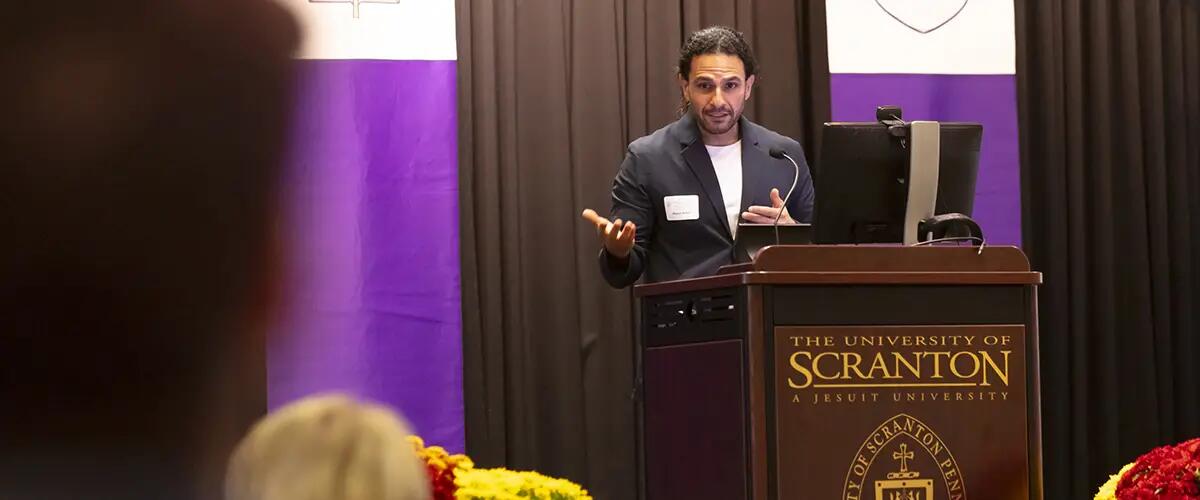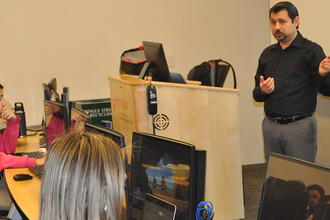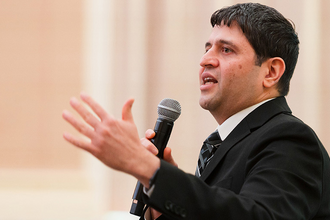
Faculty Spotlight: Mason Ameri, advocating for an inclusive workplace
This Q&A is part of the P3 Collaboratory’s Faculty Spotlight series, which profiles RU-N faculty on their research and success in and out of the classroom. The P3 Collaboratory is the university's comprehensive center for teaching, learning, faculty development, and publicly-engaged scholarship.
Mason Ameri, Ph.D., specializes in disability employment. His research is centered around developing evidence-based strategies to enhance the inclusion of people with disabilities in organizations and society. Mason’s research, backed by $12 million in grant funding, has been published in various high-impact journals and cited in popular media outlets such as The New York Times. He teaches Management Skills and Negotiations courses at Rutgers Business School–Newark and New Brunswick. He has received several noteworthy teaching honors, including multiple Dean’s Meritorious Awards, The Presidential Award for Excellence in Teaching, The Provost’s Award for Excellence in Teaching Innovations, and recognition as one of Poets&Quants’ Best 40 Under 40 MBA Professors.
How does your research, scholarship or professional experience inspire your teaching?
I look for ways to make workplaces more inclusive for people with disabilities through my research. The passion I have for this subject no doubt inspires my teaching.
In the classroom, I try to create an atmosphere where my students can learn about the business case for disability inclusion. In my Management Skills course, I make it my job to talk shop about requesting accommodations, employer DEI signaling, intersectionality, self-advocacy, etc., based on my research findings so that my students are prepared to deliver an equal playing field when it’s their turn to lead.
At the broader university level, I helped launch the new interdepartmental minor in disability studies at Rutgers University, New Brunswick. What’s great about this collaboration across several schools/departments within Rutgers-New Brunswick is that students aren’t boxed into one perspective. They can explore disability studies from different angles in the arts, sports, public policy, labor studies, etc. For example, a student might explore how the Americans with Disabilities Act shapes employment policies for people with disabilities, integrating public policy and labor studies insights for a comprehensive understanding of disability rights in the workplace. All in all, this interdisciplinary approach prepares our students to be better leaders, capable of advocating for disability inclusion more effectively in their respective fields.
What are some innovative or unique teaching practices you’d like to share?
One innovative teaching practice I’ve implemented involves reimagining the use of Canvas, our learning management system. Typically, Canvas is filled with numerous app extensions that aren’t always essential. I decided to strip down my Canvas course shells to the basics and transform the home page into a one-stop shop for all course materials.
It mirrors the course schedule in my syllabus and includes responsive links to everything from assignments and literature to media, memos, exams, and grades. This approach has simplified navigation and improved usability, giving students a clear understanding of what to expect, when, and where to find it.
Another innovation is the use of video memos, which I post weekly. These memos are designed to foster a more personal student-instructor relationship, where I provide not only words of encouragement but also guidance on what to expect in the upcoming lesson.
These video memos serve a dual purpose in helping students grasp the objective of each lesson, whether it’s a recap of previous material or a preview of what’s to come.
How does this work advance the university's mission as a publicly engaged anchor institution?
I’ve leveraged my research on disability to inform my teaching practices and curriculum development; I’ve also helped establish interdisciplinary collaborations through the disability studies minor, which empowers students to question common assumptions about disability and customize their learning based on their interests, from the arts to management, promoting a broader and more inclusive view of disability. Ultimately, all these elements of my work converge towards a singular goal that likewise advances the university’s mission: to train our students as socially responsible leaders equipped to challenge anachronistic norms and to advocate for disability inclusion.
Press: For all media inquiries see our Media Kit


